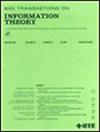中本共识工作量证明的安全性、延迟性和吞吐量
IF 2.9
3区 计算机科学
Q3 COMPUTER SCIENCE, INFORMATION SYSTEMS
引用次数: 0
摘要
本文研究了工作量证明(PoW)最长链分叉选择协议(也称为PoW中本共识)的块安全性,确认延迟和交易吞吐量之间的基本权衡。作为诚实和对抗性挖矿率、区块传播延迟限制以及以时间和区块深度测量的确认延迟的函数,导出了区块安全违规概率的新上限和下限。结果包括第一个非平凡的封闭形式有限延迟边界,适用于所有延迟和挖掘率,直至最终容错性。值得注意的是,这些上限和下限之间的差距比之前建立的与比特币及其衍生品相关的广泛参数的界限要窄,包括莱特币和狗币,以及以太坊经典。此外,该研究揭示了交易吞吐量和确认延迟之间的基本权衡,最终由所需的容错性和块传播延迟随块大小增加的速率决定。本文章由计算机程序翻译,如有差异,请以英文原文为准。
Security, Latency, and Throughput of Proof-of-Work Nakamoto Consensus
This paper investigates the fundamental trade-offs between block safety, confirmation latency, and transaction throughput of proof-of-work (PoW) longest-chain fork-choice protocols, also known as PoW Nakamoto consensus. New upper and lower bounds are derived for the probability of block safety violations as a function of honest and adversarial mining rates, a block propagation delay limit, and confirmation latency measured in both time and block depth. The results include the first non-trivial closed-form finite-latency bound applicable across all delays and mining rates up to the ultimate fault tolerance. Notably, the gap between these upper and lower bounds is narrower than previously established bounds for a wide range of parameters relevant to Bitcoin and its derivatives, including Litecoin and Dogecoin, as well as Ethereum Classic. Additionally, the study uncovers a fundamental trade-off between transaction throughput and confirmation latency, ultimately determined by the desired fault tolerance and the rate at which block propagation delay increases with block size.
求助全文
通过发布文献求助,成功后即可免费获取论文全文。
去求助
来源期刊

IEEE Transactions on Information Theory
工程技术-工程:电子与电气
CiteScore
5.70
自引率
20.00%
发文量
514
审稿时长
12 months
期刊介绍:
The IEEE Transactions on Information Theory is a journal that publishes theoretical and experimental papers concerned with the transmission, processing, and utilization of information. The boundaries of acceptable subject matter are intentionally not sharply delimited. Rather, it is hoped that as the focus of research activity changes, a flexible policy will permit this Transactions to follow suit. Current appropriate topics are best reflected by recent Tables of Contents; they are summarized in the titles of editorial areas that appear on the inside front cover.
 求助内容:
求助内容: 应助结果提醒方式:
应助结果提醒方式:


